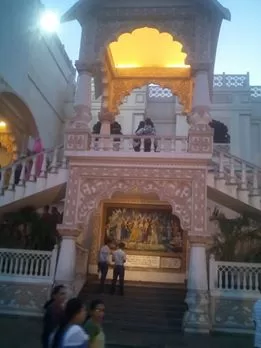Introduction:
Welcome to the ISKCON Temple in Jaipur, India. Also known as the International Society for Krishna Consciousness, ISKCON is a significant spiritual and cultural landmark in the city of Jaipur. Let’s explore the rich history, architectural beauty, and spiritual significance of this temple.
Historical Background:
The ISKCON Temple in Jaipur is part of the worldwide International Society for Krishna Consciousness movement. Established in 1966, ISKCON is a non-profit organization dedicated to spreading the teachings and values of ancient Vedic literature. The Jaipur branch of ISKCON serves as a center for spiritual growth, community service, and cultural enrichment.
Key Features and Highlights:
The ISKCON Temple in Jaipur is renowned for its beautiful architecture, serene ambiance, and spiritual atmosphere. Here are some key features and highlights:
- Architectural Beauty: The temple boasts stunning architectural design inspired by traditional Indian temple architecture. Intricate carvings, vibrant colors, and ornate decorations adorn the temple’s exterior and interior, creating a visually captivating experience for visitors.
- Cultural Significance: ISKCON temples are known for promoting Vedic culture, philosophy, and spirituality. Visitors to the Jaipur temple can participate in various cultural programs, including devotional chanting, scripture readings, and traditional ceremonies.
- Spiritual Retreat: The temple provides a tranquil sanctuary where visitors can immerse themselves in prayer, meditation, and reflection. The serene environment and devotional atmosphere offer solace and inspiration to spiritual seekers and devotees alike.
Things to Do:
At the ISKCON Temple in Jaipur, visitors can engage in a variety of activities to enrich their spiritual experience:
- Attend Daily Ceremonies: Witness the daily rituals and ceremonies conducted at the temple, including arati (worship with lamps), kirtan (devotional singing), and Bhagavad-gita discourses.
- Participate in Bhakti Yoga: Learn about the practice of bhakti yoga, the yoga of devotion, through lectures, workshops, and interactive sessions conducted by experienced teachers and spiritual leaders.
- Explore the Temple Complex: Take a leisurely stroll around the temple complex to admire the architecture, visit the deity shrines, and soak in the peaceful atmosphere.
- Join Cultural Events: Attend special cultural events, festivals, and celebrations organized by the temple community, featuring music, dance, drama, and traditional Indian cuisine.
Visitor Information:
- Operating Hours: The temple is open to visitors from early morning until late evening, with various ceremonies and programs scheduled throughout the day.
- Entry Fees: There is no entry fee to visit the ISKCON Temple in Jaipur. Donations are welcome and appreciated to support the temple’s activities and maintenance.
- Accessibility: The temple is wheelchair accessible, with facilities available for differently-abled visitors. Special arrangements can be made upon request for those with specific needs.
How to Get There:
The ISKCON Temple in Jaipur is conveniently located and easily accessible by various modes of transportation:
- By Road: The temple is situated on Sri Sri Giridhari Dauji Temple, Village Dholai, New Sanganer Road, which is well-connected by roads and accessible by car, taxi, or auto-rickshaw.
- By Public Transit: Local buses and auto-rickshaws are available for transportation to the temple. Visitors can also use ride-sharing services or hire a private cab for convenience.
- Nearest Airport/Train Station: The temple is located 7 kms from Jaipur Airport, making it easily reachable for out-of-town visitors.
Travel Tips:
- Dress Code: Visitors are advised to dress modestly and respectfully when visiting the temple, covering their shoulders and knees as a mark of respect.
- Photography: Photography is allowed in designated areas of the temple complex. However, visitors are requested to refrain from taking photos during religious ceremonies out of respect for the sanctity of the rituals.
- Footwear: Shoes are not allowed inside the temple premises. Visitors are requested to remove their footwear before entering the temple and place them in designated areas.
- Respect Local Customs: Visitors are encouraged to respect local customs, traditions, and religious practices when visiting the temple, including observing silence in designated areas and refraining from any disruptive behavior.
Temple Schedule:
| Time | Activity |
|---|---|
| 4:30 a.m. | Mangala Arati |
| 5:00 a.m. | Tulasi Arati |
| 7:30 a.m. | Shringar Darshan and Guru-Puja |
| 8:00 a.m. | Srimad Bhagavatam Class |
| 8:30 a.m. | Dhoop Arati |
| 12:00 p.m. | Raj Bhoga Arati |
| 1:00 p.m. | Temple Closes |
| 4:00 p.m. | Pushpa Arati |
| 6:30 p.m. (Winter) / 7:00 p.m. (Summer) | Sandhya Arati |
| 7:00 p.m. (Winter) / 7:30 p.m. (Summer) | Srimad Bhagwadgita Class |
| 8:30 p.m. | Shayana Arati |
| 8:45 p.m. | Temple Closes |
Sunday Program: 6:30 PM to 8:30 PM
Please note: There is a youth program every Sunday at the ISKCON Library from 4:30 PM to 6:00 PM.
User Reviews and Experiences:
Here are some user reviews and personal experiences shared by visitors to the ISKCON Temple in Jaipur:
- “Visiting the ISKCON Temple in Jaipur was a truly enriching experience. The serene atmosphere, melodious kirtan, and insightful discourses left a lasting impression on me.”
- “The architecture of the temple is breathtaking, and the devotion and dedication of the temple priests and volunteers are truly inspiring. A must-visit for anyone seeking spiritual solace.”
- “Attending the Bhagavad-gita classes at the temple helped me gain a deeper understanding of Vedic philosophy and yoga. I highly recommend participating in the temple’s educational programs for spiritual seekers.”
- “The Sunday program at ISKCON Jaipur is a delightful experience, featuring uplifting music, enlightening talks, and delicious prasadam. A perfect way to spend a Sunday afternoon.”
We hope this comprehensive guide helps you plan your visit to the ISKCON Temple in Jaipur, where you can immerse yourself in spirituality, culture
Sorry, no records were found. Please adjust your search criteria and try again.
Sorry, unable to load the Maps API.

